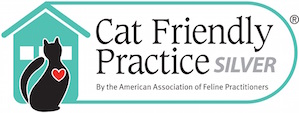New Puppy Care
 Congratulations! Your new puppy depends on you to provide everything to meet its basic needs such as: nutritious food, fresh water, shelter, playtime and exercise, preventative health care, and lots of love and attention. In addition, one of the most important things you can do for your pet is to know what is “normal” for your pet and to be able to quickly recognize signs when they are not feeling well. The veterinarians and staff here at Blue Sky want to help you meet the health care needs of your new pet.
Congratulations! Your new puppy depends on you to provide everything to meet its basic needs such as: nutritious food, fresh water, shelter, playtime and exercise, preventative health care, and lots of love and attention. In addition, one of the most important things you can do for your pet is to know what is “normal” for your pet and to be able to quickly recognize signs when they are not feeling well. The veterinarians and staff here at Blue Sky want to help you meet the health care needs of your new pet.
Vaccines
Your puppy needs to be vaccinated for rabies, distemper, adenovirus, parainfluenza, and parvovirus. Immunizations should begin at 8 weeks of age and are repeated every three to four weeks until the puppy has reached the age of four months. It is very important to complete this series of vaccines. After the “puppy shots,” a vaccine schedule based on your dog’s age and exposure will be determined by your veterinarian. An initial rabies vaccine is to be given when your puppy is 4 months old. A rabies booster should be given 1 year after the initial rabies vaccine. Thereafter, in Larimer County, law requires a rabies vaccine to be given every three years.
An additional vaccine, Bordetella, is also available for dogs. This vaccine protects against one of the bacterial strains of a disease commonly known as kennel cough. We recommend this vaccine for dogs that will be in obedience classes, boarded at a kennel, or in confined areas with other dogs such as a grooming salon, dog park, daycare, dog shows, or field trials. It takes the vaccine up to 2 weeks to become fully effective, so plan ahead!
Leptospirosis is also highly recommended. Leptospirosis is a bacterial organism that lives in the urine of wildlife. Since wildlife doesn’t discriminate with where they urinate, it’s often found in open water sources, as well. This disease affects both the liver and the kidneys, and can be fatal. Lepto is a zoonotic disease, meaning that it can be transmitted to humans. If your dog has never had a Lepto vaccine before, then it will need to be boostered in 3-4 weeks from the initial vaccine, it will then become an annual vaccination.
Intestinal Worms
A stool sample should be checked for common parasites. Puppies should be dewormed for roundworms and hookworms; we generally do this at each of their puppy visits. Based on the Center for Disease Control guidelines, we recommend annual fecal exams and deworming of your dog.
Heartworms
Heartworms are transmitted to your dog by mosquitos. Once transmitted, it is a serious disease that is dangerous to treat. There is medication available to prevent heartworm infection. We use various heartworm preventatives, including Heartgard Plus and Interceptor Plus. Both of these preventatives are chewable tablets that should be given once a month. It is recommended to give this preventative year-round. Many of these heartworm preventatives also treat specific kinds of intestinal worms.” All dogs over 6 months of age should be tested for heartworms by a blood test that can be done in our office.
Feeding
Puppies should be on a specially formulated puppy diet until 12 months of age. Large breeds can develop bone and cartilage problems if they are pushed nutritionally and should be fed a large breed dog puppy food. We recommend Science Diet, Royal Canin, Purina One, Iams, Natura pet foods. Puppies up to 3 months old should be fed 3 meals a day. After that, twice a day feeding is recommended. Fresh water should always be available. Start your puppy out right by not giving them people food when you eat! Dogs given table scraps will learn to beg and may develop poor dietary habits. These dogs may also be more likely to experience weight and dental issues as they age. Changes in the diet should be done slowly as they can lead to digestive upsets and diarrhea. Bones of any kind are not recommended, as anything as hard, or harder than, a puppy’s teeth can cause breakage.
Training
All dogs make better pets if you take the time to train them when they are puppies. We offer puppy classes here at the clinic. Our trainer has years of experience with all breeds of dogs and can help with many behavioral problems.
Exercise
It is important for your dog to get regular exercise. Having a big back yard is not enough. Daily walks and play time is necessary for a pets mental and physical health. Ask us about local trails and dog parks.
Neuter & Spay
We highly recommend that your dog be spayed (female) or castrated (male). Female dogs can be spayed at around 6 months of age. They do not have to go through a “heat” cycle and this surgery generally has no effect on their temperament. Spaying a dog before she has a heat period has been demonstrated to markedly reduce the incidence of mammary cancer later in life. Once the dog has been spayed she will no longer have heat periods and she cannot become pregnant.
Male dogs can be castrated as early as 6 months of age, but depending on the size your puppy will be when he is an adult, you should discuss neutering in more detail with the veterinarian. Castrating your dog will tend to reduce his aggressiveness toward other dogs and make him less likely to stray from home. Castrated dogs are less likely to develop prostate infections or prostate cancer in their old age.
Small breed dogs sometimes do not lose all of their baby teeth as they get older, therefore we recommend waiting to neuter them until 6 months of age so that we can pull any retained teeth at that time.
Microchips
The microchip we use is an international microchip that can be scanned anywhere to help return your pet to you as quickly as possible. We can implant a microchip at any time; however we prefer to do it at the time of neuter or spay while your pet is under anesthesia.
Dental Care
Specially formulated dental diets and chews can help prevent tartar build up in your pets teeth; however brushing your dog’s teeth at least 3 times a week is the best way to prevent plaque buildup, early loss of teeth, and bad breath. This is best initiated when your dog is young. We carry toothpaste that is especially formulated and flavored for dogs. Do not use human toothpaste because its foaming action will upset their stomach. Regular periodontal therapies and assessments may be needed annually or as recommended by the veterinarian.

 Congratulations! Your new puppy depends on you to provide everything to meet its basic needs such as: nutritious food, fresh water, shelter, playtime and exercise, preventative health care, and lots of love and attention. In addition, one of the most important things you can do for your pet is to know what is “normal” for your pet and to be able to quickly recognize signs when they are not feeling well. The veterinarians and staff here at Blue Sky want to help you meet the health care needs of your new pet.
Congratulations! Your new puppy depends on you to provide everything to meet its basic needs such as: nutritious food, fresh water, shelter, playtime and exercise, preventative health care, and lots of love and attention. In addition, one of the most important things you can do for your pet is to know what is “normal” for your pet and to be able to quickly recognize signs when they are not feeling well. The veterinarians and staff here at Blue Sky want to help you meet the health care needs of your new pet. Congratulations! Your new kitten depends on you to provide everything to meet its basic needs such as: nutritious food, fresh water, shelter, playtime and exercise, preventative health care, and lots of love and attention.
Congratulations! Your new kitten depends on you to provide everything to meet its basic needs such as: nutritious food, fresh water, shelter, playtime and exercise, preventative health care, and lots of love and attention.



